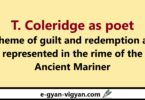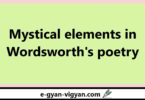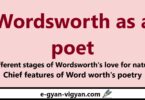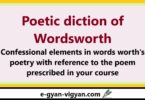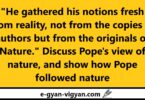
If Pope be not a poet, where is poetry to be found?” Comment on this judgment of Johnson on Pope
“If Pope be not a poet, where is poetry to be found?” Comment on this judgment of Johnson on Pope
After discussing the chief characteristics of Pope’s poetry, Dr. Johnson says that it is surely superfluous to answer the question that has once been asked, whether Pope was a poet? Otherwise, than by asking in return, if Pope be not a poet, where is poetry to be found? To circumscribe poetry by a definition will only show the narrowness of the definer, though a definition which shall exclude Pope will not easily be made. Let us look round upon the present time, and back upon the past let us enquire to whom the voice of mankind has decreed the wreath of poetry; let their productions be examined, and their claims stated, and the pretensions of Pope will be no more disputed. Had he given the world only his version, the name of poet must have been allowed him: If the writer of the Iliad were to class his successors, he would assign a very high place to his translator, without any other evidence of Genius.
Pope is a true poet because his work has all the ingredients of poetry imagination, judgment, command of language and metre. His diction is simple. There have been critics who place Pope in the first rank of English poets. But at the same time there are others who deny to Pope the name of a poet. In the eighteenth century there was little difference of opinion about his merits. Chesterfield, Swift, Addison and Warburton all praised him highly. Johnson defended him by stating. If Pope be not a poet where is poetry to be found? Swinburne says, “Matched on his own province he still stands unapproachably alone.” Machkail is of the opinion, “Pope gave to his age the kind of poetry it needed.” Voltaire regarded Pope to be “the best poet of England and at present of all the world.” Lord Byron said of him. “As to Pope I have always regarded him as the greatest name of our poetry. Neither time nor distance, nor grief, nor age can ever diminish my veneration for him who is the great moral poet of all times, of all climes, of all feelings, and of all stages of existence.” Wilson ranked him with Dante and Shakespeare and said: “Dante, Shakespeare and Pope all reflect a unified and harmonious life view. Pope’s work is a single, organic whole, as surely as Dante’s or Shakespeare’s and it shows wondrous harmony.” Cardinal Newman speaks in praise of Pope’s power of expression :
“I ascribe to him, as characteristic gift in a large sense, the faculty of expression. He has always the right word for the right idea, and never a word too much.”
A contemporary of Pope named Warton criticised Pope in his ‘Essay on the Genius and Writings of Pope’. He denied to him the position of a poet. According to him, Pope is not a poet, because the largest portion of his poetic work ‘is of the didactic, moral, and satire kind, and consequently not of the most poetic species of poetry; whence it is manifest that good sense and judgment were his characteristic excellences, rather than fancy and invention.” Warton further writes “The sublime and the pathetic are the two chief nerves of all genuine poesy. What is there transcendentally sublime or pathetic in Pope? A clear head and acute understanding are not sufficient alone to make a poet, the most solid observation on human life, expressed with the utmost elegance and brevity are morality, not poetry ….. It is a creative and glowing imagination ….. and that alone, that can stamp a writer with this exalted and very uncommon character, which so few posses, and of which so few can properly judge.”
Hazlitt also recognized Pope’s powers as a poet. He considered him “not as a poet of lofty enthusiasm, of strong imagination, with a passionate sense of the beauties of nature, of a deep insight into the workings of her heart, but a wit, and a critic, man of sense of observation, and the world.”
Great Victorian critics failed to recognize Pope’s poetic qualities, Leslie Stephen observed: “Much of his work may be fairly described as rhymed prose not in substance or tone of feeling, but only in the form of expression.” Mathew Arnold said: “Though they may write in verse, they may in a certain sense be masters of the art of verification. Dryden and Pope are not classics of our poetry, they are classics of our prose.”
Prof. Saintsbury in The Peace of Augustans frankly states his views, which may be considered the final verdict on the controversial question, “Is a Pope a Poet?”
- That to deny poetry to Pope is absurd.
- That any one who denies him something like a chief if not the chief place in his own division of poets, unquestionable as such, will have his work cut out to make the denial good.
- That Joseph Warton was perfectly right in his main position that Pope was not transcendentally a poet; though Warton frequently blundered and faltered in maintaining this.
Nevertheless to assign Pope his due place in poetry, it is necessary to understand the right definition of poetry. Pope displayed at least two of the qualifications to be laid down as necessary for the poet- vivid expression of his actual subjects and artistic use of such metre as he actually employed. To urge that there are large ranges of subjects which he perhaps could not and actually did not treat and that there was only a limited region of metre in which he was at home would at best be legitimate in reference to the third position – his claim to poetical transcendency. It is practically out of order and irrelevant as regards the first and second.
If we regard good poetry as being marked by (a) imagination, (b) aptitude for stirring emotion, (c) preference, for the concrete, (d) lyrical gift, (e) loftly sentiment and passion, then Pope cannot be ranked as a great poet. The above qualities are absent from his poetry and are to be found in the romantic poets. He has very little of passion or true imagination. His poetry is born in the mind and not in the heart. He cannot therefore be placed in the first rank of great. But he has some other qualities which may impel us to assign him a first place in the second order of poets. As stated by Dennis in the Age of Pope, “He (Pope) is the greatest satirist of individual men; he has given the finest expression to the life of the court or the ball room, and he has added more phrases to the English languagebthan any other poet but Shakespeare. “A little learning is a dangerous thing, “What oft was a thought, but ne’er so well expressed”, “To err is human, to forgive divine,” “For Fools rush in where Angels fear to tread”, “The proper study of Mankind is man,” “An honest Man’s the noblest work of God”-are some of his sayings that have passed into the English language. He is the founder of artificial style of writing, which in his hands became living and powerful. Pope may not have given a new thought to the world, but he clothed common thoughts with form, and gave them a vivid and forceful expression. Therein lies a source of pleasure which we derive from Pope’s poetry. With all these achievements Pope is certainly a poet.
English – Important links
- Hero of ‘Paradise Lost’ | Hero of Milton’s ‘Paradise Lost’ | Who is the hero of ‘Paradise Lost’
- A note on Milton’s Grand style
- Paradise Lost as a classical Epic | How does Milton employ classical epic convention in his Invocation in paradise last Book.
- “The heights were within Pope’s reach, and he reached them.” Justify and criticise
Disclaimer: e-gyan-vigyan.com is created only for education purpose and education sector. We only provide links and materials already available on the Internet. If in any way it violates the law or there is any problem then please mail us- vigyanegyan@gmail.com

